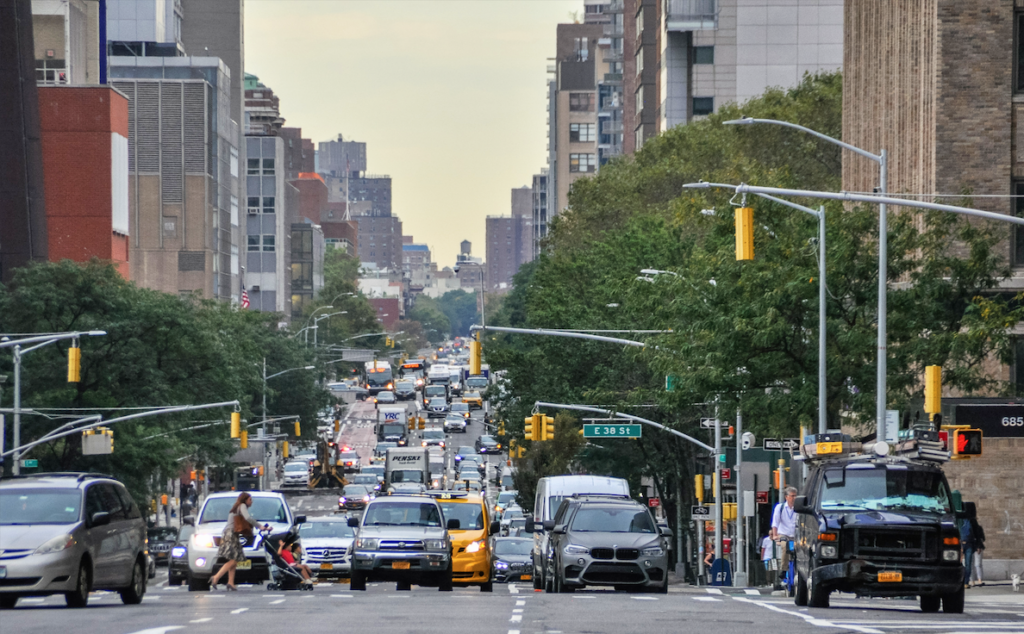
Traffic in Manhattan.
By Carmo Moniz | news@queensledger.com
As the Metropolitan Transit Authority’s congestion pricing plan inches closer to becoming reality, many New Yorkers are worrying about how they and their communities might be impacted.
The plan has suffered years of delays, costing the MTA hundreds of millions of dollars in revenue. Now that the agency has the federal government’s go ahead, it is facing concerns over the plan affecting communities in transit deserts, low income New Yorkers, environmental justice communities and other groups.
Throughout the plan’s development, the MTA held 19 early outreach sessions with a focus on environmental justice communities, and heard from hundreds of speakers in these sessions and public hearings, according to a statement from MTA spokesperson Joana Flores. The agency also held separate meetings for other groups, such as electeds, advocates and community boards.
The New York City Council’s Committee on Transportation and Infrastructure, headed by councilmember Selvena N. Brooks-Powers of Queens, heard testimony about the plan from MTA officials, residents and advocates in a Thursday oversight hearing.
“The administration has an important role to play in helping to coordinate the implementation of congestion pricing,” Brooks-Powers said. “While I’m disappointed that the representatives from the administration are not here to answer the questions that are specific to their role, the committee will be following up with a public letter with questions to the administration.”
The first panel of witnesses included NYC Transit president Richard Davey, MTA deputy chief financial officer Jai Patel, bridges and tunnels chief operating officer Allison C. de Cerreño and deputy chief for government and community relations William Schwartz. Davey emphasized increased ridership in recent months and the MTA’s improved finances after receiving a long-term bailout from the state in April.
“I am an enthusiastic supporter of congestion pricing, and we need it now,” Davey said at the hearing. “The money raised from congestion pricing is going to help pay for much needed upgrades that will bring our transit system into the 21st century.”
The congestion pricing plan is expected to raise about $1 billion annually for the MTA, which is currently saddled with $48 billion in debt. The funds will go toward $15 billion of the agency’s 2020-24 Capital Plan, which aims to improve the safety, reliability and accessibility of the city’s transit system through upgrades and larger construction projects.
Larry Penner, a former transit employee and transportation advocate, said that the $15 billion in funding could be worth less by the time they are spent on capital projects because of inflation, causing some projects to be pushed into the 2025-29 Capital Plan.
“It’s also going to have an impact on the next five year capital program, because the MTA, there’s only a certain number of staff, a certain number of track hours and a certain capacity to manage a certain number of capital projects and programs,” Penner said. “To me, that’s the biggest scandal.”
If there is excess funding for the 2020-24 Capital Plan, the projected funding from congestion pricing could transfer to the next plan, according to Flores. In the statement, Flores also said inflation is taken into account when determining the cost of capital projects, and that those costs are adjusted according to changing trends.
Installation for congestion pricing infrastructure is already underway, with scanners in place near Columbus Circle, West 61st Street and West End Avenue. License plate scanners and readers for E-Z Passes, which allow drivers to prepay tolls, are expected to be installed in more than a hundred locations around the city, with tolling slated to begin next spring.
Still up for debate are what exemptions and discounts should be included in the plan. The MTA’s Traffic Mobility Review Board, which will determine how much to charge drivers entering Manhattan from below 60th St., has received over 120 requests for exemptions, including for city workers, taxi cabs and low income residents. Taxi drivers and rideshare workers, both of which already pay a tax to the MTA, have been especially vocal about wanting to be spared from the fee.
On Tuesday, 25 city and state politicians called for taxi drivers and rideshare workers to be exempt from the tax, which could be up to $23, in a letter addressed to the TMRB. In the letter, politicians proposed a small fee per Uber or Lyft ride to be paid by passengers in place of the congestion tax, citing the companies’ role in causing congestion.
“Drivers — whether yellow cab, green cab, livery, black car or app-based — are an integral part of the fabric of New York City,” the letter reads. “The impact of an additional surcharge being taken from drivers’ income — on top of the taxes and surcharges drivers already pay to the MTA — or a significant drop in ridership because of a high per-trip fee would be devastating for Uber and Lyft drivers, and simply unsurvivable for taxi drivers.”
At the meeting, Public Advocate Jumaane Williams said he supports the congestion pricing plan, but that it should not come at the cost of others, especially low income New Yorkers. He also said he believes the MTA should provide exemptions for congestion pricing, but that there should only be a few and discounts should be more heavily relied on.
“If you are driving daily into the city, you are doing so mostly because you want to do so out of convenience,” Williams said. “If we are going to change things, that means we have to change things. I know that it is difficult for some folks, but we have to.”
South Brooklyn assemblymember Lester Chang also spoke at the hearing, and said that he would have voted against congestion pricing if he had been in office at the time of the vote.
“I fear unfortunately the genie is out of the bottle, congestion pricing is going along and the governor is enthusiastically pushing this plan,” Chang said. “I hope we have a chance to reverse this congestion pricing.”



